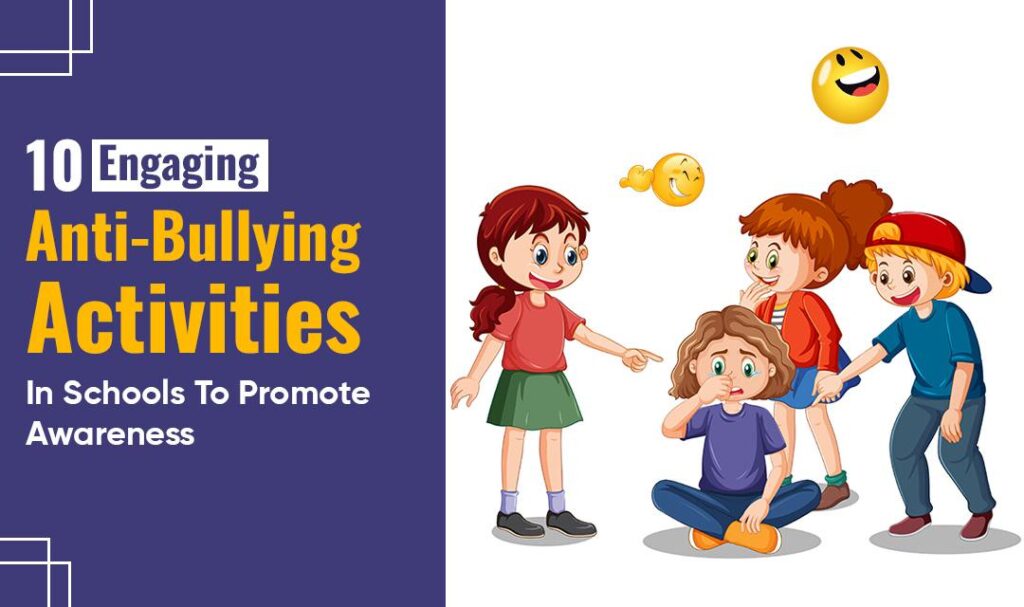
Bullying is a serious issue that affects workplaces, schools, and communities worldwide. It leaves a profound impact on an individual’s mental and emotional well-being. In schools, its effects are particularly devastating, as it can disrupt students’ academic performance, mental health, and sense of safety. According to a recent report by UNESCO, more than 30% of students’ worldwide experience bullying.
Awareness sessions and anti-bullying programs are essential to address this harmful behaviour. Participating in anti-bullying activities helps build an inclusive environment where every student feels valued. It also develops a sense of empathy and teamwork among students, creating a positive and welcoming school atmosphere.
This article will explore ten impactful anti-bullying activities that everyone should know about to raise awareness and inspire meaningful change within their schools and communities. Before that, let’s understand about the types of bullying.
Types of Bullying
Bullying can take many forms, as outlined by the University of San Diego Professional and Continuing Education. These can include:
- Verbal bullying: Name-calling and threats
- Social bullying: Exclusion and spreading rumours
- Cyberbullying: Carried out through digital platforms
Now, let’s dive straight into the activities that can best used to prevent bullying in Schools.
List of 10 Engaging Activities to Combat Bullying in Schools
Anti-bullying activities are organised initiatives, programs, or events designed to prevent bullying and create safe, supportive environments within schools and communities. The primary objective of these programs is to raise public awareness about the harmful effects of bullying.
These efforts focus on fostering an environment where individuals feel respected, supported, and free from fear of mistreatment.
Here’s a list of 10 engaging activities that can help combat bullying in schools:
Role-Playing Scenarios
Role-playing activities are a dynamic way to enhance empathy and understanding of different perspectives, providing students with essential tools to address sensitive issues like bullying. By stepping into various roles, students can study multiple points of view, explore the impact of bullying, and learn effective strategies to manage such situations within the classroom.
These interactive sessions serve several purposes:
- Highlight the emotional and social consequences of bullying.
- Foster teamwork and mutual respect among peers.
- Teach students how to express themselves effectively and listen to others.
Along with these activities, teachers can assign writing tasks that give students the opportunity to express their personal thoughts and feelings. For instance, when writing about the emotional impacts of being bullied, some students may struggle to find the right words. In these cases, contacting custom assignment writing services can provide much-needed support. With expert help, students can feel reassured knowing their thoughts will be organised and clearly communicated, allowing them to share their message with confidence and emotional depth.
Classroom Discussions on Empathy and Kindness
According to Teach Starter, report that 42% of bullying incidents occur in a classroom. Teachers can establish an environment for candid discussions about the importance of understanding other people’s emotions and feelings. Such discussions help children understand the emotional harm associated with bullying.
Students who learn the need for empathy are likely to intervene when things go wrong and, therefore, stop bullying from getting out of hand. By creating such a caring classroom atmosphere, bullying incidents can be less frequent, and a more welcoming and encouraging school climate can be developed.
The benefits of classroom discussion are as follows:
- Encourage kindness.
- Establishes wholesome relationships.
- Create a safe, supportive learning environment.
- Encourage empathy.
Buddy System Programs
Buddy system programs are really fun and effective in ending bullying in schools as they create a friendly atmosphere among the students. This system pairs the students together so that they can promote friendship, sympathy, and supportiveness in their writing, which usually pairs students from different social groups or ages.
Grand Canyon University stated that schools can adopt the peer buddy program in different ways, depending on the needs of the diverse learning community.
A school can employ different peer buddy programs, such as:
- Paring upper elementary students with young pre-K students or inclusive education is carried out for special students, which offers more structured play and academic support.
- Although there’s little experience with friendship peers who aren’t disabled, reverse inclusion brings neurotypical and exceptional students together in separate classrooms. This encourages socialisation and academic support.
- After-school buddy systems offer non-competitive sports for children of all abilities; schools can collaborate with inclusive organisations like Special Olympics and Unified Sports.
Buddy system initiatives foster an inclusive and caring school environment by empowering students to face bullying with confidence.
Anonymous Reporting Box
The anonymous report box is a simple but effective way of documenting how to prevent bullying in schools. It gives students a confidential way to report incidents without fear of revenge. It promotes accountability and empowers students, and teachers will be notified of bullying that might otherwise go unnoticed.
The anonymous report box can be turned into an engaging and successful anti-bullying activity in the following ways.
- Facilitates safe reporting.
- Increases teachers’ sensitivity and cultivates confidence between students and staff
- Promotes communication and awareness and offers choices for extra services.
- Promotes responsibility without conflict.
Schools placed an anonymous reporting box in the students’ rooms, giving them a sure means of reporting bullying and making them active participants in developing a safer environment.
Digital Citizenship Lessons
Digital citizenship courses include what is appropriate about online behaviour and the natural consequences if their students’ digital lives are not successful. An informative and entertaining way to keep schools bully-free, courses like this help them understand how to behave in the face of digital media and other forms of communication in the online world.
Also, privacy, cyberbullying, and the importance of empathy in any digital interaction are topics raised in such lessons. These courses not only address cyberbullying but also develop skills for students to become responsible digital citizens and create an inclusive online environment.
Anti-Bullying Poster Contest
An anti-bullying poster contest is an engaging activity that not only calls for creativity but also actively fights bullying in schools. This can be created by encouraging students to creatively combat bullying through art as a vehicle to spread awareness and set an environment of inclusion and kindness within the respective schools.
Students are also engaged in a competition where they display their creative skills, reflecting on the damage bullying causes and the happiness that arises when people come together. Additionally, posters can be posted around the school to remind everyone of the collective intent to have a secure and harmonious community inside the school campus.
Empathy-Building Journals
Empathy journals are among the effective and innovative ways to stop bullying in schools. Such journals may teach empathy and understanding through their medium, forcing the students to rethink more conscientiously about not only their feelings and experiences but also the perspectives of others.
Empathy journals may become a fun tool for reducing bullying, especially through:
- Journals help learners to cultivate self-awareness by reflecting upon their emotions, experiences, and reactions.
- One of the central traits of empathy is that one understands things from someone else’s perspective.
- To this end, students are guided to empathise notebooks and gain an understanding of other people’s emotions and experiences.
- The frequency of the student’s participation in empathy-building journaling will lead to the development of an amiable and joyful school climate.
Kindness Chain
The Kindness Chain is one of the best anti-bullying activities that encourages students to be nice and care for one another to defeat bullying within schools. Under this program, students are challenged to do good deeds. They are then recorded on colourful paper strips. No matter how small an act is, it is recorded and then joined to form an enormous chain, symbolising the total accumulation of all of their good deeds.
Additionally, students participating in the Kindness Chain learn that even the tiniest act of kindness makes all the difference, so they are inclined to take more active measures to help prevent bullying and forge lasting friendships with their peers.
Peer-Led Workshops
Peer-led workshops are an excellent entertaining strategy to reduce bullying in schools, as they involve keeping students actively engaged for positive school climate participation. The programs focus on conversations and training about bullying, empathy, and conflict resolution, offered by trained student leaders.
UNC School of Education organised an anti-bullying conference which focused on the relationship between social media and bullying. The majority of speakers strive to analyse the alarming rise in online harassment and cyberbullying, reflecting on the various problems and consequences of this digital element of bullying prevention.
Here, the influence of social media platforms and the means of handling such issues in an increasingly interconnected society will be elaborated upon. When an open, secure communication space is established, worries can be expressed, experiences shared, and solutions drawn up through teamwork.
Inclusive Group Activities
Group activities, therefore, encourage cooperation, understanding, and a feeling of community among the students. Thus, they prove to be a very potent tool in the fight against school bullying.
They encourage cooperation and a reduction of feelings of loneliness-all of which are general underlying culprits of bullying behaviours.
Some reasons inclusive group activities may be successful at preventing bullying include:
- Fosters teamwork
- Encourages interaction and community involvement
- Reduces alienation and gang behaviour through differences
- Fosters conflict resolution and problem-solving skills
- Promotes sustainable school culture changes
Final Thought
Anti-bullying activities in schools play a pivotal role in raising awareness about the importance of stopping bullying behaviour. When schools engage students in meaningful anti-bullying efforts, they help build a stronger, more inclusive community rooted in respect and safety for everyone.
Teachers are leaders in this process, guiding students to understand the harmful impacts of bullying and encouraging their active participation in discussions on this topic. Schools can spread this message effectively through lectures, seminars, workshops, and thoughtfully designed tasks such as assignments and essays that stimulate meaningful engagement and reflection.
However, for some students, discussing or writing about such emotionally charged topics can be challenging. To manage this, they hire the most reliable assignment writing services in the UK for guidance. By getting the necessary support, these students can become advocates for change, fostering a safer, more welcoming environment where every individual feels respected and protected.












